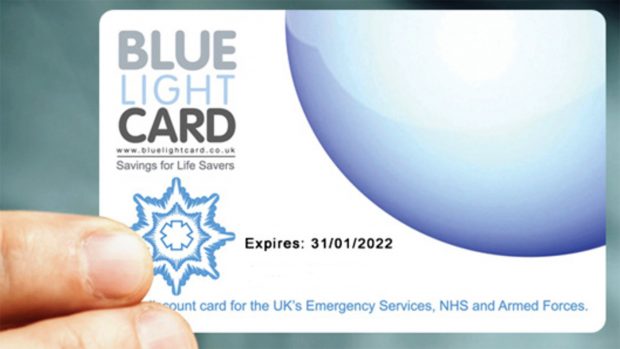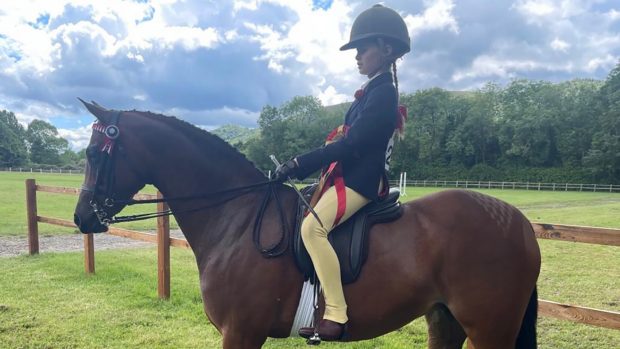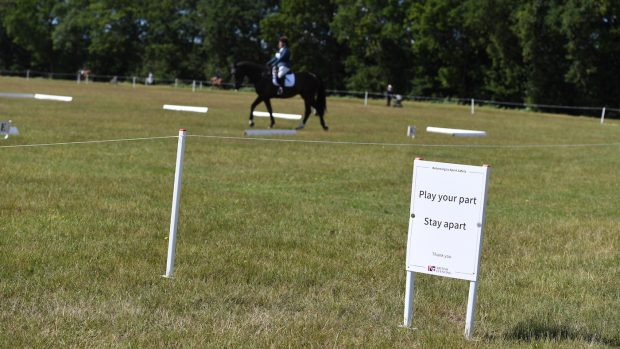When coronavirus hit and Spain went in to lockdown in March, Tenerife showjumper José Fumero had just left hospital after incurring a serious injury in a fall while competing on the Sunshine Tour. With a broken shoulder, no groom and unable to drive, the 26-year-old has had no choice but to stay in his horsebox at the venue for the past two months. We caught up with Jose to find out how he’s been coping with self-isolation so far away from his base in Belgium — and to discover whether we may see more equestrian teams representing the Canary Islands in the future.
Q: First of all, how is your shoulder recovery?
José Fumero: “Fairly good, the recovery has flown by. The first days I didn’t feel too well, my arm was completely immobilised so I could barely move. But now, I’m living a normal life again. I FaceTime a physiotherapist from Madrid to keep up with my recovery, and this helps me feel better and stronger. I’ve even started to ride.”
Q: Tell us what happened when Spain went in to lockdown?
José: “On one hand I’m glad that if the fall had to happen, it was when there are no competitions ahead and I haven’t had to force myself to be back on time. On the other hand, it’s been a burden. On the same day I left the hospital after the operation, the competition was cancelled, and I didn’t have my groom. I couldn’t drive back to Belgium, I couldn’t ride or even take care of their basic needs. In the end we managed to find a solution to most of our problems, and here we are in Montenmedio. In full honesty, we are more than okay, in these magnificent facilities practically just for us. We did have to distribute nine of our 11 horses that we had during the Tour, now we have four and shortly we will have to regroup three more.”

Q: Do you know when you’ll return to Belgium?
José: “It seems like the competition calendar will remain inactive for a few months so, for now, we are pleased to be here in Montenmedio where the organisers have opened their arms to us. Our intention is to go back to Belgium as soon as it’s safe. Various other riders have had to stay here with us. I think there must be around 50 horses that have had to stay.
Q: You are currently living in your truck — that can’t be easy?
José: “We had a house rented during the Tour, then we rented another house for the following weeks. But with all the limitations that were being set, as well as the police controls we had to go through everyday, the best solution was to move into the van so we didn’t have to move from the facilities. We are handling is very well — in the end we spend most of our time in the stables and we only go to the van to eat and to sleep.
Q: What type of training are you doing with the horses?
José: “Many lead walks, lungeing and riding but being very careful, without unnecessary risks.”
Continued below…

‘Forget about getting to shows and paying for your Mercedes’: world number one puts lockdown into perspective
Stuck in lockdown with no shows to look

Subscribe to Horse & Hound magazine today – and enjoy unlimited website access all year round
Q: How difficult has it been for someone from the Canary Islands to turn professional?
José: “We have a very good Canarian representation, with Ismael García Roque the winner of the Spanish adult championship last year. We have pride for all Canaries, because it is not easy to make the leap from the Canary Islands to the peninsula. The level of competition is low, you can count the number of competitions during the year on one hand and the number of riders in large events are usually very small. When I was younger, I was lucky enough to meet a very good group of riders of the same age, and we decided to try to compete in the Spanish championship that was formerly held in summer in Montenmedio. The team was made up of Fernando Jerez, Rocío Arencibia and me. Neither had ever competed off the island, nor did we have any experience in this type of competition with so many people. We were missing a fourth rider, but we still won a team gold medal. Since then my family did everything possible so that I could continue training and we moved two horses to Seville with Aurelio Gutiérrez and thus be able to compete more frequently. Then, at the age of 15, we made the decision to come and live in Madrid. So yes, it is difficult to become a professional rider with that handicap — you have to make many uneasy decisions, but it’s possible.”
We continue to publish Horse & Hound magazine weekly during the coronavirus pandemic, as well as keeping horseandhound.co.uk up to date with all the breaking news, features and more. Click here for info about magazine subscriptions (six issues for £6) and access to our premium H&H Plus content online.




